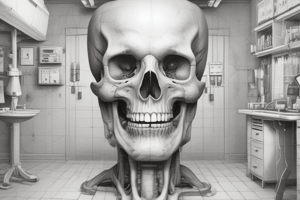Podcast
Questions and Answers
Which of the following anatomical landmarks is identified by the coronoid process?
Which of the following anatomical landmarks is identified by the coronoid process?
- Nasal fossa
- Coronoid process (correct)
- Anterior nasal spine
- Zygomatic process
What is the radiolucent structure located at the apex of the mandibular premolars?
What is the radiolucent structure located at the apex of the mandibular premolars?
- Coronoid process
- Zygomatic process
- Anterior nasal spine
- Mental foramen (correct)
Which projection is used to evaluate the soft tissue outline of the face?
Which projection is used to evaluate the soft tissue outline of the face?
- Lateral cephalometric view (correct)
- Panoramic view
- Tomography
- Cervical X-ray
Which imaging modality is known to cause claustrophobia in patients?
Which imaging modality is known to cause claustrophobia in patients?
What is a disadvantage of Cone Beam CT (CBCT) imaging?
What is a disadvantage of Cone Beam CT (CBCT) imaging?
Which projection can help to compare both maxillary sinuses?
Which projection can help to compare both maxillary sinuses?
What is the minimum voltage of characteristics radiation?
What is the minimum voltage of characteristics radiation?
Which component serves as the source of electrons in radiography?
Which component serves as the source of electrons in radiography?
What is the effect of too steep vertical angulation in periapical radiography?
What is the effect of too steep vertical angulation in periapical radiography?
Which vertical angulation is recommended for mandibular premolars?
Which vertical angulation is recommended for mandibular premolars?
Which color code is used for film holders designated for posterior teeth?
Which color code is used for film holders designated for posterior teeth?
What is the main benefit of automatic film processing?
What is the main benefit of automatic film processing?
Which of the following is the clearing agent used in radiography?
Which of the following is the clearing agent used in radiography?
Flashcards
Mental Foramen
Mental Foramen
A radiolucent area located at the apex of mandibular premolars. It appears as a dark, oval-shaped space on radiographs.
Zygomatic Process
Zygomatic Process
A radiopaque structure, often appearing as a 'U' shape on radiographs. It's formed by the cheekbone and extends toward the ear.
Lateral Cephalometric View
Lateral Cephalometric View
A projection used in dentistry that captures a lateral view of the skull, highlighting the soft tissue outlines of the face.
Image Layer
Image Layer
Signup and view all the flashcards
Cone Beam Computed Tomography (CBCT)
Cone Beam Computed Tomography (CBCT)
Signup and view all the flashcards
What projection helps compare maxillary sinuses?
What projection helps compare maxillary sinuses?
Signup and view all the flashcards
What's the minimum voltage for characteristic radiation?
What's the minimum voltage for characteristic radiation?
Signup and view all the flashcards
Where do electrons originate in an X-ray tube?
Where do electrons originate in an X-ray tube?
Signup and view all the flashcards
What happens when the vertical angulation is too steep in periapical radiography?
What happens when the vertical angulation is too steep in periapical radiography?
Signup and view all the flashcards
What's the vertical angulation for mandibular premolars?
What's the vertical angulation for mandibular premolars?
Signup and view all the flashcards
What color are film holders for posterior teeth?
What color are film holders for posterior teeth?
Signup and view all the flashcards
What is a cone cut on a radiograph?
What is a cone cut on a radiograph?
Signup and view all the flashcards
What causes light spots on a radiograph?
What causes light spots on a radiograph?
Signup and view all the flashcards
Study Notes
Diagnostic Oral Radiology Midterm Questions
- Maxillary Sinus Comparison: Occipital mental view can compare maxillary sinuses.
- Characteristic Radiation Minimum Voltage: 70 volts.
- Electron Source: Filaments.
- Periapical Radiography Steep Angle: Foreshortening.
- Mandibular Premolar Vertical Angulation: -10 degrees.
- Posterior Film Holders Color Coding: Yellow.
- Radiographic Faults: Cone cut and light spots are faulty radiographs. (Images provided)
- Film Processing Benefit: Automatic film processing eliminates the need for a darkroom.
- Clearing Agent: Sodium thiosulfate.
- Film Restrainer: Potassium bromide.
- Preservative: Sodium sulfate.
- Gelatin Swelling Ingredient: Sodium bicarbonate.
- Image Size/Shape Variation: Distortion.
- X-ray Divergence: Magnification.
- Image Contrast: Difference between dark and light areas.
- Radiographic Exposure Sensitive Organ: Thyroid and lymphoid tissue.
- Radiation Resistant Organ: Muscle.
- Ionization Cause: Compton scatter.
- Water Radiolysis Toxin: Hydrogen peroxide.
- ALARA Acronym: As low as reasonably achievable.
- General Public Maximum Permissible Dose: 0.1 rem/year.
- Radiation Measurement Tool: Film badge. (Image provided).
- Position Distance Rule Angle: 90-135 degrees.
- Pre-Radiography Action: Cover the dental chair with plastic.
- Non-Critical Instrument: Lead apron.
- Safelight Leakage Check: Coin test.
- Anatomical Landmark: Coronoid process, mental foramen, zygomatic process, nasal fossa, and anterior nasal spine. (Images provided)
- Soft Tissue Facial Outline Projection: Lateral cephalometric view.
- Panoramic Imaginary Zone: Image layer.
- Multi-Tissue Imaging Modality: MRI (magnetic resonance imaging).
- Claustrophobic Imaging Modality: MRI.
- CBCT Disadvantages with Metal Restorations: Streak artifacts.
- CBCT Advantages: Reduced radiation dose.
- Radiography Image Capture Method: Sensor.
- Wireless Imaging Method: Phosphor plates.
- Digital Imaging Disadvantage: Rigid sensors.
- Digital Imaging Advantage: Superior resolution.
Studying That Suits You
Use AI to generate personalized quizzes and flashcards to suit your learning preferences.




